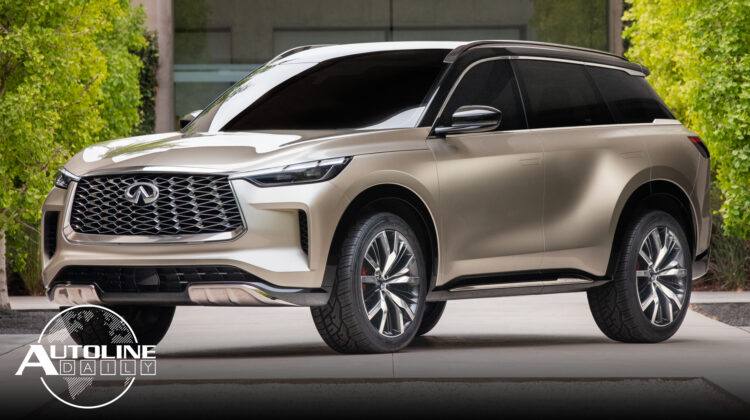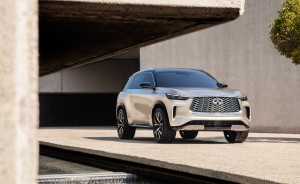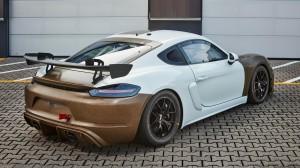
Listen to “AD #2925 – Infiniti Previews Next-Gen QX60; Harley-Davidson Exits India; SEC Fines BMW For Manipulating Sales” on Spreaker.
Follow us on social media:
Runtime: 7:40
0:23 India Plans Battery Incentives to Spur EV Growth
1:19 Harley-Davidson Exits India
2:33 Infiniti Previews Next-Gen QX60
3:48 Hyundai Reveals Plush EV Interior Concept
4:28 Canoo Creates Fun Looking Kart
5:32 SEC Fines BMW For Misleading Investors Over Sales
6:12 Porsche Develops Natural-Fiber Body Parts
Visit our sponsors to thank them for their support of Autoline Daily: Bridgestone and Intrepid Control Systems.
This is Autoline Daily, the show dedicated to enthusiasts of the global automotive industry.
INDIA PLANS BATTERY INCENTIVES TO SPUR EV GROWTH
Governments around the world are investing billions to spur the growth of electric vehicles. And now India is joining in. Reuters reports the government is proposing $4.6 billion in incentives to lure companies to build advanced batteries in the country. India hopes this will get more electric vehicles on its roads, to help reduce its dependence on oil. And to further incentivize companies to manufacture batteries in the country, India plans to raise import taxes on batteries from 5% to 15% in 2022. If electric vehicle adoption becomes widespread, India believes it can slash its oil imports by as much as $40 billion by 2030. It’s easy to see why it wants to get more EVs on its roads, only 3,400 EVs were sold in the country last year. So it’s hoping these incentives will kick start that market.
HARLEY-DAVIDSON EXITS INDIA
And sticking with India for the moment, Harley-Davidson announced it will no longer sell and manufacture motorcycles in the country. Harley opened its operations in India in 2009, but the company only assembled 4,500 bikes last year, mostly from imported knock down kits, which were slapped with high taxes. On top of that, it had to deal with high import tariffs for motorcycles it didn’t assemble in the country, which further cut into its profits. But Harley isn’t completely abandoning the market. Reuters reports the company is in talks with India’s Hero MotoCorp for a distribution deal that will allow its bikes to be sold there. Financial details aren’t known yet. But Harley isn’t the only American company to scale back its operations in India. GM pulled out of the market in 2017 and Ford moved most of its assets into a joint venture with Mahindra.
INFINITI PREVIEWS NEXT-GEN QX60
Utility vehicles are king right now and Infiniti is previewing the design of the next-generation QX60. The automaker says it was going for a more upscale and commanding design with this concept, which is called the QX60 Monograph. Although concept might not be the right word to describe this vehicle. Slap some regular door handles on it, maybe tone down the lower section of the front and rear fascia and it looks pretty production ready to us. And that makes sense, since the production QX60 will be revealed sometime next year. Following a number of other recent reveals, the QX60 Monograph features a light up sequence as the driver approaches that starts with the illuminated logo in the grille and fans out into the headlamps. Also note how the rear tail lights seem to stretch across the entire width of the vehicle and wrap around the sides. You can check out the QX60 Monograph for yourself at the company’s headquarters in Japan or at the Beijing auto show, but if those destinations are out of the question right now, Infiniti provided a QR code so you can experience the vehicle in augmented reality. Just look for the link in the description box or in today’s transcript.
HYUNDAI REVEALS PLUSH EV INTERIOR CONCEPT
And while Infiniti didn’t show the inside of the QX60, Hyundai has a concept interior for us to look at. The IONIQ Concept Cabin leverages an EVs increased interior space and power supply to integrate home electronics and appliances into vehicles, like large TVs, a robot vacuum and UV lights. Features like these will first appear in the IONIQ 5, a dedicated EV that is scheduled to launch next year. And remember, IONIQ is the name Hyundai will use for all its upcoming dedicated EVs. This is not a new version of the IONIQ sedan that is currently offered.
CANOO CREATES FUN LOOKING KART
And here’s something kind of cool. Remember Canoo? The EV startup that has those interesting-looking shuttles. Well, it took the electric skateboard that those shuttles ride on, stripped it down to its core, slapped a seat and steering wheel on and went ripping through the desert. Canoo dubbed its creation “skatekart,” which helps show off its high-performance powertrain that makes up to 500 horsepower and its steer-by-wire system that allows customers to place the steering wheel practically anywhere. I had two thoughts after seeing skatekart. The first is, this reminds me of a stripped down Corvette the guys on the show Roadkill made. And I wonder if we could see a return of aftermarket body kits, like you used to see in the back automotive magazines. I think that would be cool too.
SEC FINES BMW FOR MISLEADING INVESTORS OVER SALES
A year ago, FCA was fined $40 million by the U.S. Securities and Exchange Commission for misleading investors about its sales figures. And now BMW is being fined for the same reason. The SEC says that from 2015 to 2019 the automaker “maintained a reserve of unreported retail vehicles sales…that it used to meet internal monthly sales targets without regard to when the underlying sales occurred.” The SEC says this mislead investors about its sales performance and customer demand while raising money in the U.S., so it fined the automaker $18 million.
PORSCHE DEVELOPS NATURAL-FIBER BODY PARTS
Racing is a great way for automakers to develop new technology. But instead of testing out new powertrain tech, Porsche is testing body parts. At this year’s Nurburgring 24-hours race, the GT4 version of the Cayman will feature a complete body-kit made from natural-fiber composite materials. The renewable raw materials replace the metal and plastic injected molded components of the car. In terms of weight and stiffness, the natural-fiber parts are similar to carbon-fiber composites and meet the same safety and quality standards. The natural-fiber components are less expensive to manufacture and don’t require as much energy to produce. And out on the track, the parts don’t vibrate as much and in an accident, they break into larger, less sharp pieces.
But that wraps up today’s show, thanks for watching and have a great weekend.
Thanks to our partner for embedding Autoline Daily on its website: WardsAuto.com

John McElroy is an influential thought leader in the automotive industry. He is a journalist, lecturer, commentator and entrepreneur. He created “Autoline Daily,” the first industry webcast of industry news and analysis.










